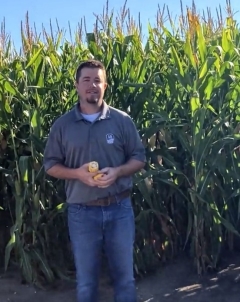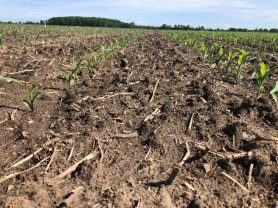Westfield, Indiana, USA
Jan. 17, 2023
Have you ever wondered how seed companies decide which products make the bag? For LG Seeds, that decision comes after years of testing and trials whittling the field from hundreds of thousands of hybrid candidates to a select few.
“LG Seeds relies on people like me to take agronomic notes and provide a feedback loop on farmer needs,” says Justin Schneider, an LG Seeds agronomist who is part of the brand’s pre-commercial research (PCR) team. That team has the final say on what hybrids are commercialized.
“The whole point of our rigorous selection process is to provide farmers with more choices for better results, year after year,” Schneider explains.

PCR team agronomists like Justin Schneider play a critical role determining what hybrids are commercialized.
PCR team monitors hybrids from planting through harvest
“The breeders and research team handle the early stages of testing. The PCR team is the final judge. We give the go-ahead for commercialization,” Schneider explains. Yield is always a priority, but the selection process goes beyond choosing the highest-yielding hybrids.
“Here in Michigan, my notes are largely on tar spot, Gibberella ear molds and emergence issues related to our heavy, poorly draining clay soils and early planting,” Schneider explains. He looks for hybrids with strong emergence and vigor scores that also have good tar spot tolerance.
PCR team members’ primary responsibility is taking season-long, detailed agronomic notes specific to their geographies. They monitor emergence and plant vigor and watch for any pollination or flowering issues. They keep notes on plant characteristics like leaf orientation and husk coverage and how hybrids handle disease and other stressors.
“We take our last look at these research trial fields just before harvest, noting any stalk lodging or ear drop issues,” Schneider details. The PCR team gives grain quality scores, examines kernel length/girth and delivers cap scores that correlate to test weight.

After emergence, LG Seeds agronomists can be found in PCR plots taking notes on early vigor.
Putting PCR data to use
“Our statistic-guru breeders analyze the agronomic data we collect, considering hybrid performance on different soil types, row spacings, tillage situations and irrigation practices. We try to anticipate every situation a farmer might encounter,” Schneider explains.
Once the trial yield data has been gathered and split by maturity group, the selection process for commercial launch begins. Members of the PCR team gather to examine the yield data and agronomic notes and have conversations about what worked best and why for scenario after scenario.
Schneider explains the PCR team compiles a list of hybrids that can readily handle a broad brush of agricultural needs as well as ones that fit more specific needs. “The beauty of our research program,” he says, “is we’re able to select specific products for a given geography and promote it accordingly.”
Hybrids that made the cut
Schneider says Michigan farmers should take note of the new hybrids LG49C28 and LG52C42, both of which have great tar spot tolerance. “LG49C28 performs well across multiple soils and tillage situations, delivering large kernels and excellent test weight,” he reports. LG52C42 has a taller stature that makes it a great dual-purpose hybrid ideal for silage or grain, Schneider continues.
Another new hybrid Michigan producers should pay attention to is LG51C62, which Schneider reports “has HUGE yield potential and great emergence.” It performs best in higher-yielding environments.
Other regional standouts include the following.
- LG64C43 was a top performer in the 2022 trials that did well in high- and low-yielding environments as well as on both irrigated and non-irrigated ground. Strong emergence and early vigor make it a good fit for early planting.
- LG68C18 was a high performer in the Mid-South research trials in 2022. It comes from a proven genetic background and has shown it can maintain healthy stalks and roots in the face of stress.
- LG60C86’s rapid emergence and strong early vigor scores make it well suited for early planting and no-till acres. The hybrid with strong stalks and high tar spot tolerance thrives in the central Corn Belt and productive soils in the West, especially under high yield management practices.
- LG65C76 features an upright leaf structure, strong stalks and roots that allow higher planting populations for high yields. In the Western U.S., this product displayed strong performance at medium populations in dry environments.
“This selection process gives us the ability to say, these are our top three options for a no-till farmer using irrigation,” Schneider says, as an example. “If we can do that, we can help our farmers be the most successful on their unique operations. Contact your local LG Seeds agronomist or district sales manager for help choosing the right hybrids for your acres.”
ABOUT LG SEEDS
LG Seeds is a dealer-driven national seed brand offering solid agronomic support, straightforward service and consistent plant performance that yields. LG Seeds’ portfolio of broad trait choices and tailored genetics brings corn, soybean, sorghum and alfalfa products to fit farmers’ performance goals. For more information visit LGSeeds.com and follow us on Facebook, Twitter, Instagram and LinkedIn.
ABOUT AGRELIANT GENETICS
AgReliant delivers one-of-a-kind, high-performing hybrids farmers can’t get anywhere else. Regardless of the brand on the bag – AgriGold®, LG Seeds or PRIDE® Seeds – count on AgReliant Genetics for unique, diverse genetics with formidable yield and multiple trait options. Our seed-only focus opens new innovation for our brands and for our farmer customers, whether they grow corn, soybeans, sorghum or alfalfa. Learn more at AgReliantGenetics.com.